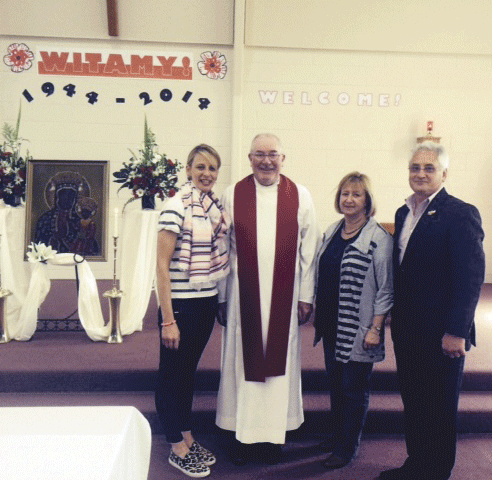 New Zealand’s first refugees: Pahiatua’s Polish Children
New Zealand’s first refugees: Pahiatua’s Polish Children
Tereska Lepionka-Carroll
This year marks the 70th anniversary of a unique episode in our history – the arrival and settlement of New Zealand’s first invited refugees to our country. On 1 November 1944, 733 mostly orphaned Polish children and their adult caregivers arrived by ship in Wellington. A number of commemorative events have been held throughout New Zealand.
The children shared the fate of1.7 million Poles at the start of World War II ethnically cleansed from their homes in eastern Poland under Stalin’s orders. They were deported in cattle wagons to forced labour camps into the depths of Russia’s Siberia. Life was brutal, surrounded by sub-zero temperatures, constant hunger, disease and death.
The Polish citizens fled from their capture in Siberia and found temporary refuge in Iran.
In distant New Zealand, the news about the displaced children came to the attention of the Honorary Polish consul’s wife, Countess Maria Wodzicka. She wanted to create a safe haven for a group of the children and shared her idea with the Prime Minister Peter Fraser’s wife, Janet Fraser. Their idea became a reality when Mr Fraser and the New Zealand wartime government offered shelter and hospitality to 733 Polish children and 102 caregivers to accompany them.
The government’s gesture together with other New Zealand organisations, such as the Catholic Church and the Red Cross, was the start of providing the children and their guardians shelter in new but foreign country.
On arrival to New Zealand the refugees were taken from Wellington through the countryside to a camp in Pahiatua created especially for them. Called ‘little Poland’ the camp became their new home. Everything was conducted in Polish including schooling and Mass services and even the barracks and streets had Polish titles.
The fresh New Zealand countryside gave the children a large playground with plenty of nooks and crannies to explore, paddocks to play rugby on and flowers fresh for picking.
Eric Lepionka was eight years old when he arrived and recalls, ‘There was such a difference coming from Iran to New Zealand. We were used to living in a hot, sandy and pebbly desert. As a child I witnessed a lot of deaths in Iran and we left many friends behind. Coming to New Zealand, I recall feeling anxious and excited at the same time.
‘Running on the green grass in Pahiatua was like running on velvet.
I remember having my first ever warm shower at the camp. The sensation was incredible. It felt liberating and to this day I appreciate a warm shower. That feeling has never left me.’
The stay in New Zealand was supposed to be temporary with the plan to return the children to Poland as soon as the war ended. However, in 1945 it was obvious, with the outcome of the Yalta conference, the children would not be returning to their homeland, then under communist rule.
The New Zealand Government, Polish consular staff and the Catholic Church agreed to assimilate the children within New Zealand.
The Defence Force and the Catholic Church gathered 830 invitations from New Zealand families for the children and their guardians to share two weeks’ holiday. The children were then sent to attend mostly New Zealand Catholic schools or to other towns to learn various trades.
A highlight of the 70th anniversary commemorative events for the community was the moving and unforgettable journey ‘back home’ to Pahiatua on Thursday 30 October. Festooned with red and white flags the township of Pahiatua came out en masse to welcome home their ‘Polish children’ and to reconnect and share stories. Pahiatua’s parish priest, Fr Brian Walsh, and St Brigid’s parish liturgy committee shared the reflective and touching experience.
‘We wanted to make a prayer offering and blessing for all the life-stories in the commemorative book Pahiatua Polish Children,’ said Sharon Crooks from the committee.
‘I prayed the Holy Spirit would guide us and create a worshipful and thankful atmosphere.’
This group of Polish Children refugees became self-sufficient, hardworking and loyal New Zealand citizens. They retained their Catholic religion with special de
votion to our Lady, Queen of Poland.
Seventy years on, together with their families, they said ‘thank you’ to the New Zealand Government, the New Zealand Defence Force, the Catholic Church, the caregivers, the teachers and all who extended a helping hand.
God bless – ‘Bog Zaplac’.